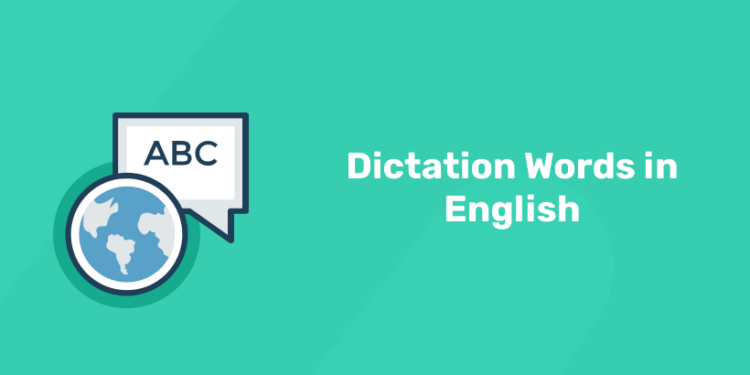Table of Contents
Dictation words are a set of words that are given to a person to write down as they are dictated. Dictation is conducted typically in the context of a language or typing exercise. These words are intended to improve the person’s ability to listen, process and write down information accurately, and quickly. In this article we will discuss Dictation Words in English.
Get hands-on with our Spoken English course – sign up for a free demo!
Use of Dictation Words
Dictation words can be useful for a variety of reasons, including:
Improving language skills:
Dictation exercises can help improve listening, writing, and spelling skills. By listening carefully to a spoken passage and transcribing it accurately, learners can improve their understanding of grammar and vocabulary. They can also improve their ability to spell words correctly.
Building memory skills:
Dictation can also help build memory skills. When transcribing a passage, learners must remember what they have heard and recall it in order to write it down. This process can help strengthen memory skills and improve recall abilities.
Practicing transcription skills:
Dictation exercises can also be useful for practicing transcription skills. This skill is important for a variety of professions, including transcriptionists, court reporters, and medical scribes. By practicing dictation exercises, learners can improve their ability to accurately and efficiently transcribe spoken words.
Enhancing focus and attention:
Dictation exercises require a high level of focus and attention. Learners must listen carefully to the spoken passage in order to transcribe it accurately. This can help improve focus and attention skills, which can be useful in many aspects of life.
Dictation Words in English – List
Dictation exercises can help improve a person’s spelling, vocabulary, listening, and concentration skills. They can be practiced in a classroom setting, in language courses, or on one’s own with the help of dictation software or apps. Dictation words can range from simple and basic words for beginners to more complex and technical words for advanced learners. They may also include commonly used phrases, idioms, and expressions that are used in everyday communication.
Overall, dictation words are a useful tool for improving language skills. They can help a person become a more effective communicator in various situations.
Given below is a set of dictation words in alphabetical for the convenience of the students:
| Intermediate level
|
Advanced level
|
| A
Ambition Affection Appropriate Accomplish Atmosphere
B
Benefit Bicycle Business
C Campaign Challenge Consequence Controversy Courage
D
Development Demonstration Distinguish Diversity Dynamic Documentary Discovery
E Enthusiasm Environment Essential Exploration Evidence
F
Fascinating Function Foundation Friendship Freedom
G Garden Generation Geography Globalization Graceful
H History Health Happiness Hospitality Harmony
I
Initiative Influence Improvement Immigration Inspiration
J
Journey Joyful Journalism Judicial Junior K
Knowledge Kindness Kinship Keyboard Kinesiology
L
Language Literature Leadership Learning Legacy
M
Mystery Movement Management Motivation Multiculturalism
N
Nature Necessity Novelty Nurturing Nostalgia
O
Opportunity Organization Optimism Observation Obstacle
P
Partnership Progress Performance Population Perception
Q
Quality Quantity Question Quotient Quickness
R
Respect Relationship Responsibility Resilience Reasoning
S
Strength Success Society Science Self-esteem
T
Teamwork Technology Tradition Talent Tolerance
U
Understanding Unity Urbanization Universe Utilization
V
Victory Vision Virtue Venture Vulnerability
W
Wisdom Wealth Work Well-being Wilderness
X
Xenophobia Xylophone X-ray X-axis X-intercept
Y
Youth Yield Yearning Yellow Yesterday
Z
Zeal Zenith Zest Zone Zebra |
A
Accommodation Accountability Authenticity Ambiguity Abundance
B
Benevolent Bureaucracy Beneficial Business Bias
C
Catastrophe Circumstance Commodity Controversy Conundrum
D
Delegation Discretion Divergent Dilemma Distinguish
E
Eccentricity Efficacy Extravagance Exacerbate Exemplify
F
Frustration Fallacy Fluctuation Facilitate Futuristic
G
Gesticulate Grandiose Galvanize Germinate Gracious
H
Hierarchy Hyperbole Heterogeneous Homogeneous Hypothetical
I
Immaculate Inevitable Inquisitive Intrinsic Indispensable
J
Juxtaposition Judicious Jocular Jarring Jeopardy
K
Kinesthetic Kudos Knead Kibitz Kismet
L
Luminous Laissez-faire Longevity Liability Lament
M
Metamorphosis Myriad Magnitude Malleable Morose
N
Nostalgia Nuance Nihilism Nonplussed Nefarious
O
Obfuscate Obsequious Omnipotent Obligatory Opulent
P
Pessimism Prejudice Pragmatic Paradox Proclivity
Q
Quandary Qualitative Quixotic Quell Quirk
R
Resilience Rhetoric Reverberate Rancor Remuneration
S
Subterfuge Superfluous Surreptitious Synonymous Serendipity
T
Transcend Tenacious Trepidation Turmoil Truculent
U Ubiquitous Unprecedented Unctuous Usurp Utilitarian
V
Vexation Visceral Veracity Venerable Vicissitude
W
Whimsical Wistful Wry Wanton Wretched
X
Xenophobia Xenial Xeric Xylotomy Xanthous
Y
Yearning Yielding Yuletide Yore Yahweh
Z
Zealot Zenith Zephyr Zestful Zeugma |
Ready to take your Spoken English skills to the next level? Sign up for a free demo today!
How to Ace Dictation Words in English?
1: Which of the sentences below is grammatically correct?
To ace dictation words in English, you can follow these tips:
Improve your listening skills:
Dictation requires good listening skills. You can improve your listening skills by listening to English podcasts, news broadcasts, audiobooks, or watching English movies or TV shows. Practice listening to different accents and speeds of speech to enhance your comprehension.
Practice writing:
Dictation involves writing down what you hear. You can improve your writing skills by practicing writing regularly, paying attention to grammar, punctuation, and spelling.
Build your vocabulary:
Dictation requires a good command of vocabulary. You can improve your vocabulary by reading books, newspapers, and magazines in English. Make a habit of looking up new words and learn their meanings and how to use them in sentences.
Take notes:
When listening to dictation, take notes of key words or phrases that you hear. This will help you remember the details when writing down the passage.
Start with easy dictation exercises:
Begin with easy dictation exercises, such as short passages with simple vocabulary and grammar. Once you feel comfortable with these, you can move on to more challenging exercises.
Repeat the dictation:
Listen to the passage multiple times, until you are comfortable with the content. Repeat the dictation exercise until you can write down the entire passage accurately.
Practice regularly:
Regular practice is the key to success in dictation. Set a routine and practice dictation exercises every day, gradually increasing the difficulty level as you progress.
Spoken English Course for Guaranteed Confidence and Career Growth
Spoken English Course by Entri App: Enhance your communication skills, gain certification, and boost your career with confidence.
Join Now!Conclusion
Dictation words in English can be a useful tool for improving language skills, memory, transcription abilities, and focus and attention. To ace dictation words, you should focus on improving your listening and writing skills, building your vocabulary, taking notes, starting with easy exercises, repeating the dictation, and practicing regularly. With dedication and patience, you can improve your dictation skills and become more confident in your ability to accurately transcribe spoken English passages.
speak english like a native speaker
Dictation Words in English: FAQs?
1.What is dictation in English?
Ans. Dictation is the process of listening to a spoken passage and writing it down word for word. It can be used as a language learning exercise to improve listening, writing, spelling, and transcription skills.
2. How can dictation help improve my English skills?
Ans. Dictation can improve your English skills by enhancing your listening, writing, and spelling abilities, along with your vocabulary and memory. It can also help you become more familiar with English grammar and sentence structure.
3. What kind of passages can be used for dictation exercises?
Ans. Passages for dictation exercises can vary in length and difficulty level, but they should typically contain a variety of vocabulary and grammar structures. Common sources for dictation exercises include news articles, short stories, and dialogues from movies or TV shows.
4. How can I improve my listening skills for dictation exercises?
Ans. To improve your listening skills for dictation exercises, you can practice listening to English audio sources such as podcasts, audiobooks, or news broadcasts. You can also try watching English movies or TV shows with subtitles to help you better understand the spoken language.
5. How can I check my accuracy in dictation exercises?
Ans. You can check your accuracy in dictation exercises by comparing your written transcription to the original passage. You can also use dictation software or websites that provide feedback on your accuracy and give you suggestions for improvement.
6. Can dictation exercises be done alone or with a partner?
Ans. Dictation exercises can be done alone or with a partner. Working with a partner can be helpful for practicing communication and collaboration skills. However, doing dictation exercises alone can also be beneficial for improving focus and attention.
7. How often should I do dictation exercises to see improvement in my English skills?
Ans. The frequency of dictation exercises depends on your personal goals and schedule. However, it is generally recommended to practice regularly, at least a few times a week, to see improvement in your English skills.











